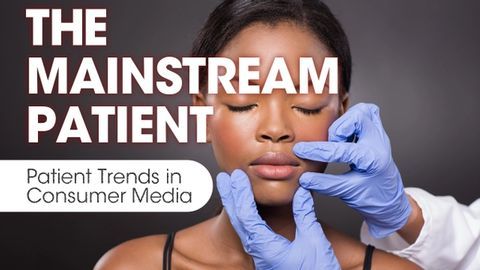- General Dermatology
- Eczema
- Alopecia
- Aesthetics
- Vitiligo
- COVID-19
- Actinic Keratosis
- Precision Medicine and Biologics
- Rare Disease
- Wound Care
- Rosacea
- Psoriasis
- Psoriatic Arthritis
- Atopic Dermatitis
- Melasma
- NP and PA
- Skin Cancer
- Hidradenitis Suppurativa
- Drug Watch
- Pigmentary Disorders
- Acne
- Pediatric Dermatology
- Practice Management
The Mainstream Patient: June 19
This week's edition of the Mainstream Patient features stories about tinted sunscreens that don't leave a white cast, laundry detergent for sensitive skin, UPF clothing for summer, and more.

New this week: Allure lists sunscreens that won't leave a white cast on darker skin types and Elle interviews Esther Olu. NewBeauty asks dermatologists about laundry detergent for sensitive skin and Byrdie talks about the magic of UPF clothing in the summer. Women's Health considers the impact of AI on how consumers view their skin and Self asks dermatologists about the difference between skin purging and breakouts.
The Ultimate List of Brown Girl-Approved Sunscreens That Don't Leave a White Cast
"A deeply harmful skin-care misconception that just won't die is that those with darker complexions don't need to wear daily sun protection. Now melanin may be magical, but it isn't sun-resistant. No matter your skin tone, you should be wearing sunscreen every day — even when it's cloudy or you're staying indoors. Frequently skipping sunscreen increases your risk for skin cancer. Michelle Henry, MD, a board-certified dermatologist in New York City, says that even though darker skin types have some natural protection against UV light, the highest possible level is SPF 13, which is below the recommended level of SPF 30. People with darker skin may be less susceptible to skin cancer, but, Henry says, 'when those with darker skin are diagnosed with skin cancer the outcomes are typically worse, likely because they are found at later stages.'"
Esther Olu, The Melanin Chemist, Does It All
"Esther Olu has swatched, mixed, and spritzed more cosmetic products than the average beauty editor. Her hands have probably balanced the ingredients in your favorite serum and her decerning nose has likely tingled after concocting the perfect scent pairing in popular perfumes (though she remains tight-lipped on which ones). A career in science was always in the cards for Olu, but deciding what industry she wanted to be listed on her future white lab coat proved to be a laborious journey that required lots of research and reflection. However, she knew her future role melded the worlds of science and beauty. Process of elimination led her to cosmetic chemistry."
The Best Laundry Detergent for Sensitive Skin, According to Dermatologists
"Omaha, NE dermatologist Joel Schlessinger, MD says dermatologists generally recommend one detergent for their patients whether or not they have sensitive skin: All Free and Clear ($9). He doesn’t seem to be wrong as both Monroe, LA dermatologist Janine Hopkins, MD and Miami dermatologist Dr. Deborah Longwill also named this detergent the best for sensitive skin and beyond. However, there are pros and cons. Dr. Schlessinger notes that while this is a great option for skin, it may not get clothes quite as clean as other detergents."
The Magic of UPF Clothing and Why It's a Must-Have All Summer
"The importance of sunscreen has been drilled into our heads for years. Not just in the summer, but every day. Dermatologists across the board have said that not only can wearing sunscreen prevent skin cancer, but it can also protect your skin from sun damage, wrinkles, and other skin issues. If you’re not using sunscreen in your skincare routine, you’re not doing it right."
The AI Revolution Might Change How You See Your Skin
"When I agreed to have an artificial intelligence-powered app determine the age of my skin based on a scan of my face, I wasn’t sure what to expect. While I’m religious about sunscreen and have dabbled with injectables, I also have acne-prone skin that’s led to a bunch of dark spots—and, also, I’m tired. A few moments after my photo was taken with an iPad, the Perfect Corp AI Skin Analysis app informed me that my 'skin age' is 35 years old. (My actual age is 33.) Rude. But that’s the risk of this kind of information, says Eunice Park, MD, a double board-certified facial plastic surgeon in Syosset, New York, who invited me into her office to try the tech."
Is My Skin ‘Purging,’ or Is Something Else Causing This Annoying Breakout?
"It’s tempting to give up when your skin is telling you 'no' in the form of a pesky breakout—especially if you struggle with acne and understand that feeling of disappointment all too well. But not all pimples are signs to stop using a new product. Some ingredients may make things worse before they get better through a process called purging'—a common reaction to certain skin care actives, a.k.a. ingredients that draw out the gunk (or, more scientifically, oil, dead skin, and acne-causing bacteria) from underneath the skin’s surface, Joshua Zeichner, MD, associate professor and director of cosmetic and clinical research in dermatology at the Mount Sinai Hospital in New York City, tells SELF."
